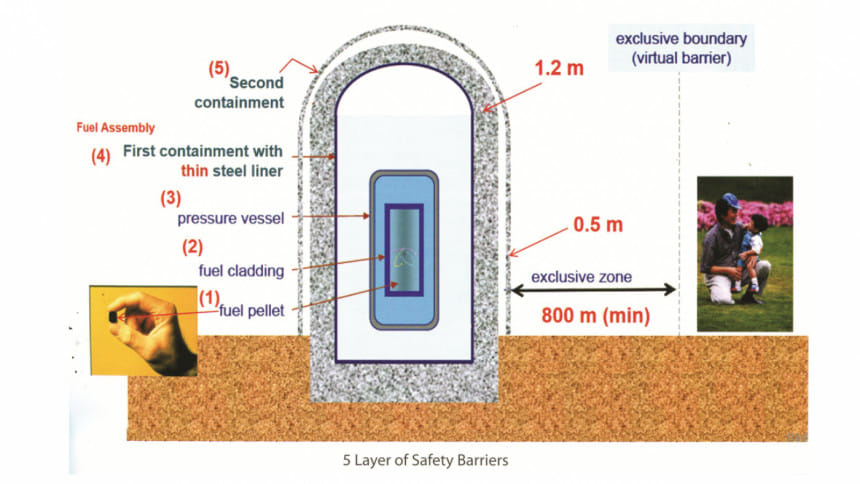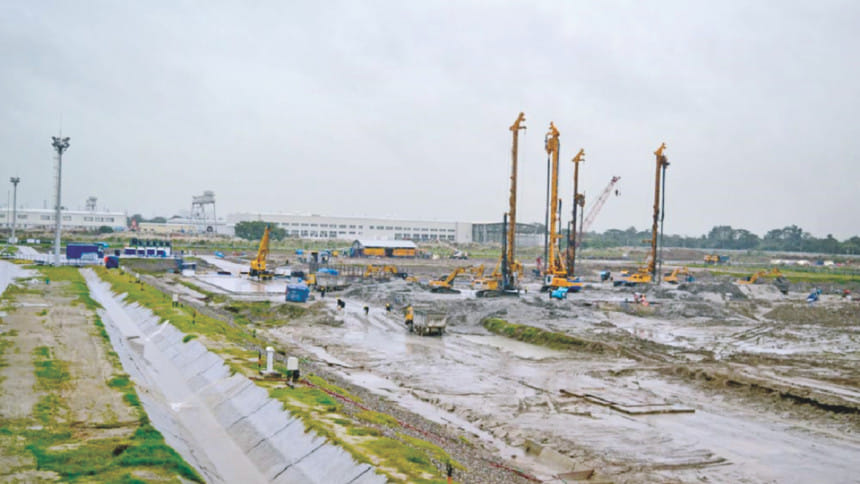All you need to know about Rooppur Nuclear Power Programme

Bangladesh has been maintaining robust growth over the last two decades. The present government is committed to elevate the country to the status of a middle income country by 2021 and a developed country by 2041. For this vision to be materialised a huge supply of energy in the form of electricity will be required in a secured and affordable manner. Our indigenous resource of primary energy would be inadequate to meet the entire demand.
Globally, nuclear power is considered to be one of the cheapest and reliable sources of electricity. Virtually, it emits no greenhouse gases. Considering international experience, Bangladesh has decided to develop its own nuclear power programme. The government has plans to generate at least 4000MW electricity from nuclear sources by 2030, which will be about 10 percent of the total targeted electricity generation.
The country has already made considerable progress in establishing the first ever nuclear power plant at Rooppur. Dr Mohammad Shawkat Akbar, Project Director of the Rooppur Nuclear Power Plant (RNPP), informs that the government is planning to observe the First Concrete Pouring Day (FCD) at the end of October or in mid- November this year. On that day, the construction of the main power plant will be officially launched. It is expec-ted that the first and second unit of RNPP, each with the capacity of 1200MW, will be in commercial operation in 2022 and 2023, respectively.
Russia is the key partner in this project in terms of both financial and technological support. According to the Inter-governmental Credit Agreement signed between Bangladesh and Russia on July 26, 2016, Russia will provide USD 11.38 billion of the total cost of USD 12.65 billion for the construction of RNPP. On the technical side, the RNPP owner organisation, Bangladesh Atomic Energy Commission (BAEC ), signed a general contract with Russian JSC Atomstroyexport for RNPP on December 2015. The nuclear power plant will be an AES-2006 type (Novovoronezh NPP-2) consisting of two power units with VVER-1200 reactors. The Russian organisation is responsible for supplying all the necessary equipment and nuclear fuel as well as training the project management team and the RNPP operational and maintenance personnel. Bangladesh has also signed two inter-governmental and inter-agency agreements with India under which the Global Centre for Nuclear Energy Partnership (GCNEP) of India will provide training and consultancy services for the implementation of the RNPP project.
Any nuclear power programme needs to be supported by the required infrastructure that includes legal and regulatory framework, management plan, technological requirements, safety, finance and human resource development. Dr Akbar shares that Bangladesh has adopted the International Atomic Energy Agency (IAEA) Milestones guidelines for addressing these issues. It has been made mandatory to follow codes, guides and standards of IAEA in designing, commissioning and operation and maintenance of the RNPP.
IAEA conducted an Integrated Nuclear Infrastructure Review (INIR) mission including a team of international experts during November 9–15, 2011 to review the infrastructure issues for the development of the national infrastructure for nuclear programmes for both Phase 1 and 2. The mission made fifty recommendations and twenty specific suggestions for developing appropriate infrastructure to build RNPP in a safe and orderly manner. Dr Akbar informs that an integrated work plan (IWP) for the period of 2012–15 was developed to address each of the recommendations and suggestions. Since 2009 Bangladesh has been implementing IAEA technical cooperation projects under which IAEA has provided fellowships, scientific visits and training in the areas of project management, technology assessment , management of funding and financing, workforce planning, etc. Recently, Director General of IAEA Yukiya Amano paid a visit to the site of the RNPP project in Pabna on July 3, 2017. He expressed his satisfaction over compliance in implementing the nuclear project adding that Bangladesh is constructing the plant maintaining high standards of security measures.

Bangladesh government has already established several organisations and legal and regulatory frameworks in order to build a national infrastructure for nuclear power—Nuclear Energy Programme Implementing Organization (NEPIO)—to coordinate the works of the organisation involved in the development of the nuclear structure, Bangladesh Atomic Energy Regulatory Authority (BAERA), Rooppur Project Management Unit for implementation of the project and Nuclear Power Plant Company Bangladesh Ltd (NPCBL) as the operating organisation.
After the Fukushima accident in March 2011, the safety of nuclear plant has become ever more prominent. When asked about the the safety measures taken for this RNPP plant, Project Director Dr Shawkat Akbar says that after the Fukushima incident the government has put greater emphasis on the site safety aspects and engineering solutions to increase resistance of plants to extreme events and cliff edge effects. He adds that five layers of safety barriers would be put in place. The nuclear power plant units have been designed by adopting site-specific safety measures. The design basis for natural and human-induced external events such as earthquakes, floods, aircraft crash, explosions, etc., and the radiological impact on the population and on the territory during both normal and accidental conditions have already been analysed and defined. The technical provisions for the safety measures (both active and passive system) have been implemented in the design of the plants to meet the acceptance criteria established for design extension conditions. These provisions will ensure back-up for all safety functions needed to prevent the occurrence of beyond-design-basis accidents like Fukushima, claims Dr Akbar.
Another safety concern is the management of nuclear waste, particularly spent fuel of nuclear power plant. The government has recently signed an agreement with Russia under which spent fuel of the RNPP will be returned to Russia.
Finally, a large number of skilled professionals are required for the implementation, operation and maintenance of a nuclear power programme. Currently, 369 professionals are working in the project management unit. The operating organisation Nuclear Power Plant Company will recruit and train 2,700 personnel year by year as the project progresses. To develop human resources for implementation of the nuclear power programme, several training and higher education programmes have already been undertaken. More than 300 BAEC officials have been trained under the IAEA programme. About fifty students have already been sent to Russia to study nuclear engineering. More students will be sent this year. They will work in the nuclear power programmes of the country after their return. Dhaka University and Military Institute of Science and Technology have already established departments to provide higher education on nuclear engineering.
Nuclear power projects are considered to be a milestone in the development history of a country. Besides generating power, these projects have spin-off benefits for the overall socio-economic development of a nation. Bangladesh has embarked upon the Rooppur Nuclear Power Plant project to realise the enormous potential of using nuclear energy for peaceful purposes. Successful completion, operation and maintenance of the project will make our nuclear aspirations come true.

 For all latest news, follow The Daily Star's Google News channel.
For all latest news, follow The Daily Star's Google News channel. 



Comments